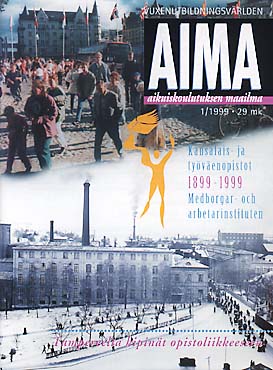 English
summary
English
summary
CELEBRATION YEAR FOR ADULT EDUCATION CENTRES - 100 YEARS OF TRADITION
It is a birthday time for adult education centres in Finland! The year 1999 will be a year devoted to celebrate the 100 year-old-existence of adult education centres in our country. Today we can proudly state, that almost in every municipality there is at least one adult education institute which provides adult education courses for everyone interested. The courses are available for all people. Every year there are 600 000 students in adult education centres. The current challenge for the liberal adult education policy in general is to ensure that adult education will continue to be provided throughout the country, also in remote areas.
VIEWING THE HISTORY
The idea of educating adults was brought to Finland from Sweden. In Sweden, the worker’s Institute of Stockholm was founded already in 1885. In Finland, the movement started in the city of Tampere, where some active members of the community were worried about the mental spirit of local workers. The same people were also worried about the growing popularity of socialism. These two factors inspired to establish the first adult education institute to Finland. The Worker’s Institute of Tampere was founded on January 16, 1899. The mission of the first institute was to organise series of lectures which were to promote positive attitudes towards popular education. The main target group was working class people even though all activities were open for all others as well.
GROWING NEED FOR VOCATIONAL TRAINING AND PRACTICAL SKILLS
One of the basic functions of all adult education centres has always been the purpose of providing all-round education for the members of the local community. This function is still as important as ever. However the capability of providing vocationally oriented training and education for the improvement of practical skills is becoming more and more important. Also the number of different development projects has been growing in recent years. Adult education centres differ from each other, because each institute is entitled to plan their own « Educational Menu » according to the needs and hopes of local people who are their customers as students. The general goal for all adult education centres is to provide adult education which will help people to develop themselves, inspire people to continue their studies and strengthen the educational equality.
Aija-Leena Luukkanen
Luukkane@pt.lu
After a long day in the factory, workers found energy to study during the evenings. (Tampere, 1900’s)
